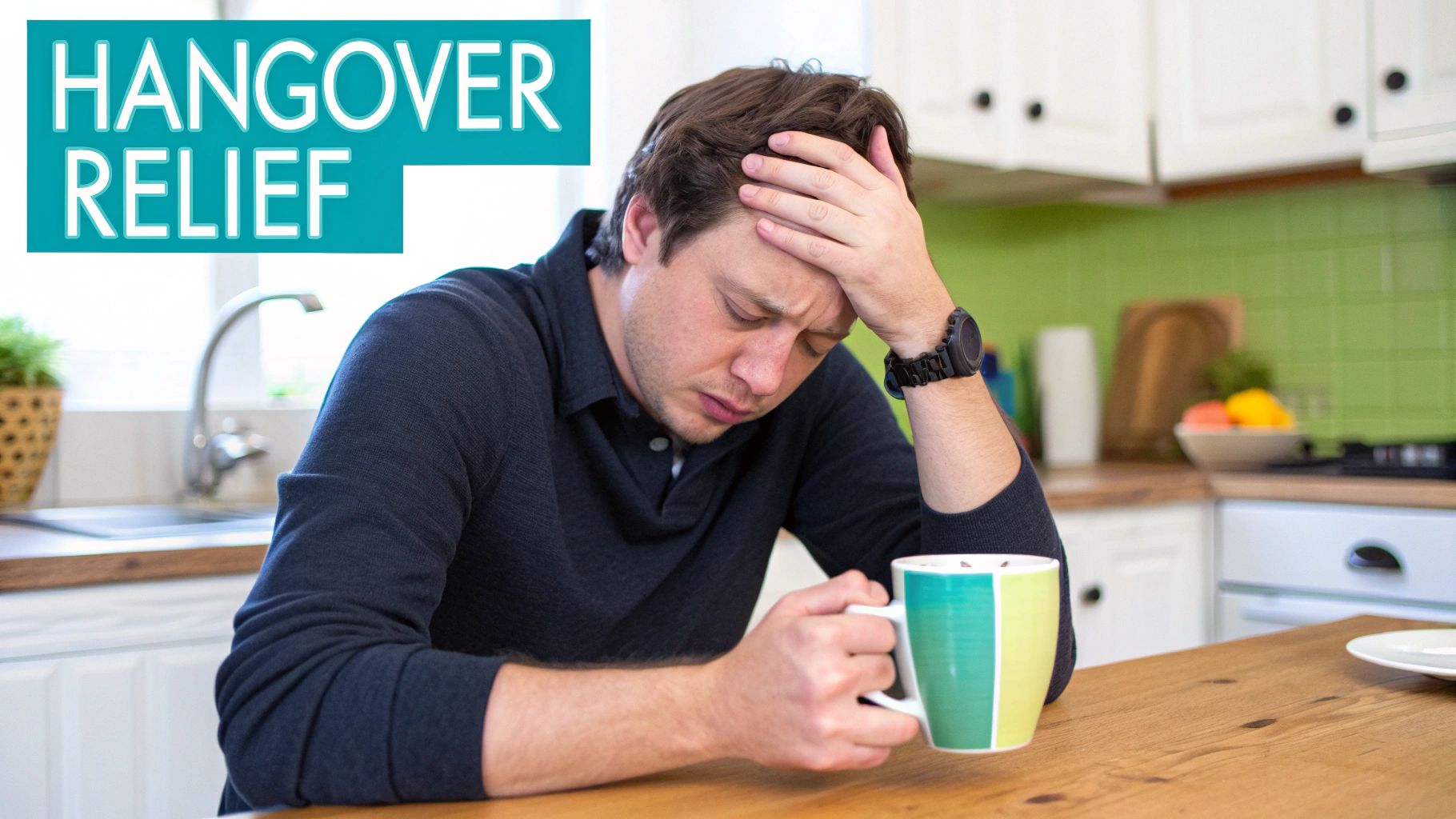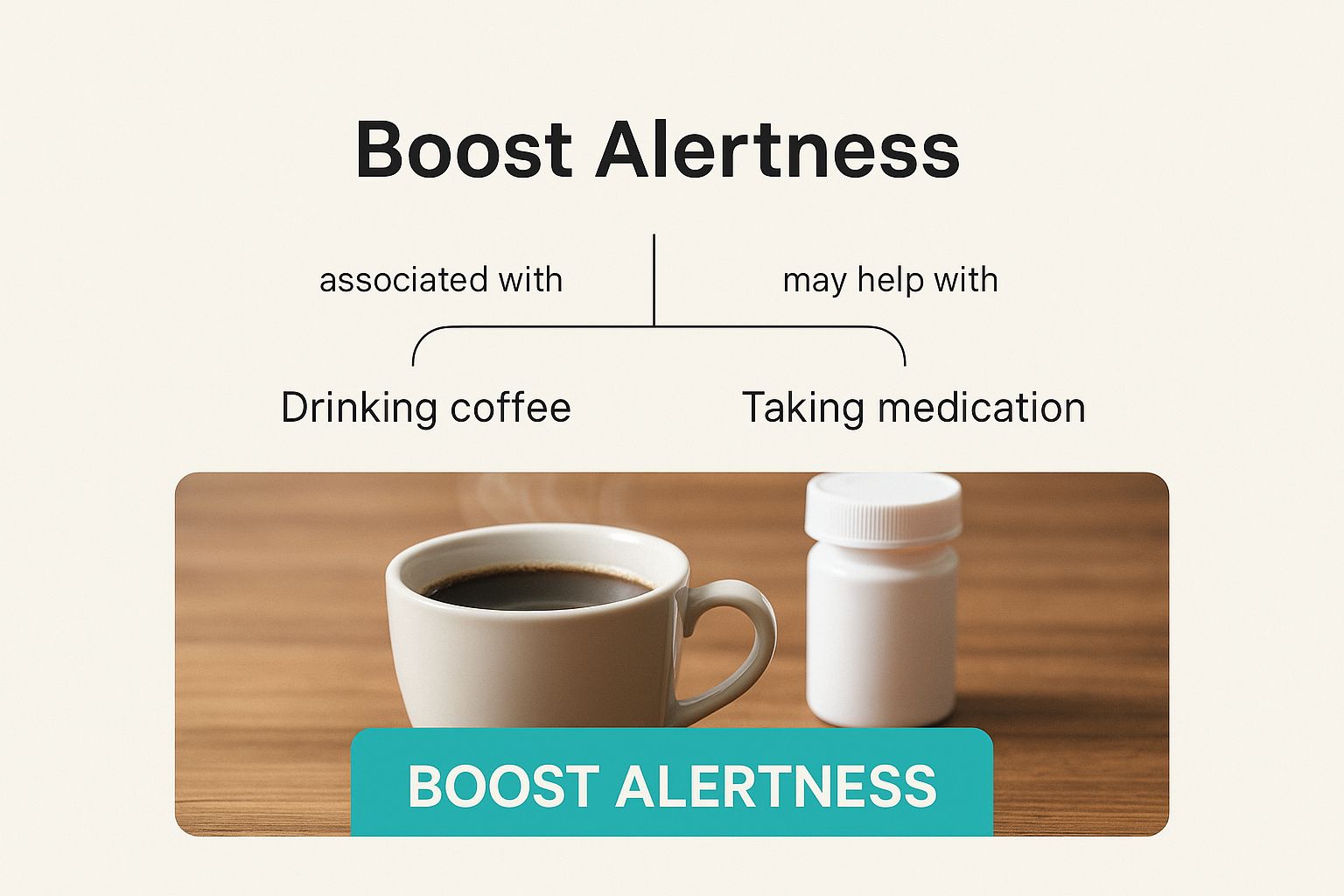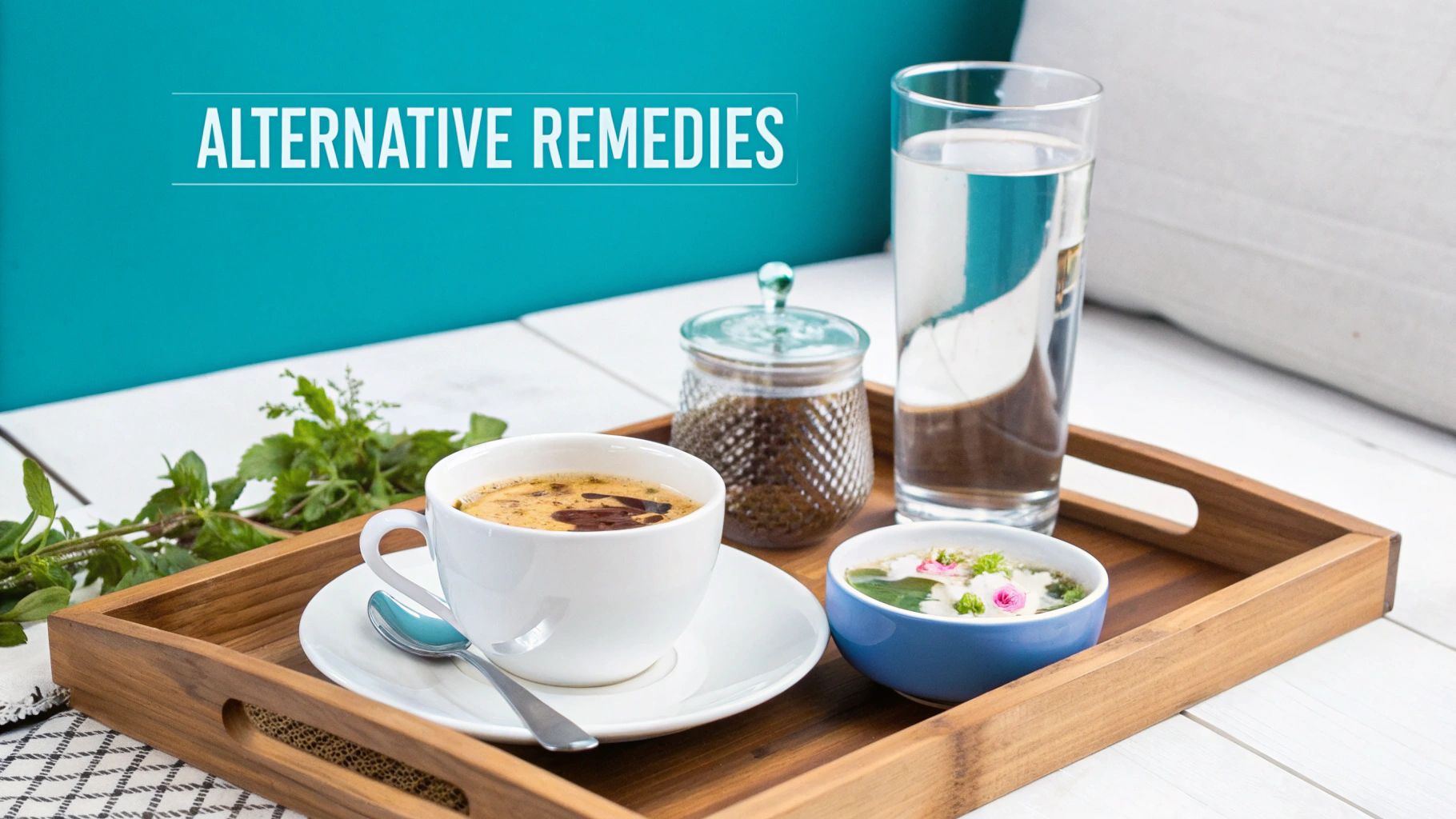

· By Annemarie
Caffeine and Hangovers The Real Truth
It's the age-old question whispered by anyone who’s woken up with a pounding head and a fuzzy brain: will a cup of coffee actually help?
The short answer? It’s a trade-off. Sure, caffeine can give you a temporary jolt of alertness and fight back against that soul-crushing fatigue, but it’s no magic cure. In fact, it might even make some of your worst symptoms, like dehydration and anxiety, even worse.
The Morning-After Debate: Should You Drink Coffee?

For so many of us, reaching for that morning coffee is a sacred ritual. But when you’re hungover, that simple act becomes a surprisingly complex decision. The kick from caffeine can feel like a godsend, momentarily cutting through the grogginess and mental fog from the night before. But don’t be fooled—that relief is usually just skin deep.
When you look at the science, you see that caffeine and hangovers have a real double-edged sword relationship. While research confirms caffeine can make you feel more alert, it doesn't do anything to lessen the overall misery of a hangover. One study found that people who drank caffeinated alcoholic drinks felt more awake the next day, but their hangovers were just as bad as everyone else's. You can dig into the study's findings on hangover perception here.
What this really means is that coffee is basically putting a mask on the problem, not providing a real solution. It tricks your brain into feeling better for a little while, but it completely ignores the real issues: dehydration, inflammation, and a terrible night's sleep.
To help you weigh your options when you're staring into that coffee mug, here's a quick rundown of the pros and cons you're signing up for.
Caffeine and Your Hangover At a Glance
Here’s a simple table to break down what you can expect when you mix caffeine with a hangover.
| Potential Benefit (The 'Pros') | Potential Drawback (The 'Cons') |
|---|---|
| Temporarily boosts alertness and fights fatigue. | Worsens dehydration due to its diuretic effect. |
| Can provide short-term relief from headaches. | May increase anxiety, jitters, and heart rate. |
| Improves mood and concentration for a short period. | Can irritate an already sensitive stomach lining. |
| Fulfills a daily ritual, providing psychological comfort. | Does not address the root causes of the hangover. |
Ultimately, a cup of coffee might give you the temporary boost you need to feel human again, but it comes with a few strings attached.
Understanding What a Hangover Does to Your Body
To really get why the whole caffeine and hangovers thing is so tricky, we first have to look at what’s actually going on inside your body. A hangover isn't just one problem; it's a full-on system meltdown. Picture your body's internal control panel, with every single warning light flashing at once—all thanks to last night's alcohol.
That pounding headache you're dealing with? The main culprit is usually dehydration. Alcohol is a diuretic, a fancy word meaning it makes you pee—a lot. As you lose all that fluid, your body gets seriously parched, leading to that classic trio of thirst, dizziness, and a throbbing head.
The Real Reasons You Feel Terrible
But it's not just about being dehydrated. If only it were that simple. Your body is juggling several other major issues that a cup of coffee just can't touch:
- Inflammatory Response: Alcohol kicks your immune system into high gear, triggering an inflammatory reaction. This is a big reason you feel so generally unwell, almost like you're coming down with the flu.
- Sleep Disruption: Sure, a few drinks might knock you out fast, but the sleep you get is terrible. Alcohol messes with your natural sleep cycles, robbing you of the deep, restorative rest your brain desperately needs to reset and repair.
- Gastrointestinal Distress: Alcohol is a direct irritant to the lining of your stomach and intestines. This is what ramps up stomach acid, slows everything down, and leaves you feeling nauseous or with an upset stomach.
This infographic does a great job of showing how caffeine's main gig—making you feel more awake—really stacks up against these deeper problems.

As you can see, caffeine is basically a mask for fatigue. It does nothing to fix the physiological train wreck happening underneath.
A hangover is your body's way of screaming that its core systems—hydration, sleep, and inflammation—are completely out of whack. Slapping a stimulant on top won't fix any of that.
When you put all these pieces together, you get the miserable, multi-layered experience we all know as a hangover. If you want to go even deeper into the science, you can learn more about what causes hangovers in our detailed guide. Getting to know the root causes is the first real step toward finding relief that actually works.
How Caffeine Actually Affects Your Hangover
When you’re staring down a hangover, that first cup of coffee feels like a lifeline. But the relationship between your body and that morning brew is more complicated than it seems. Think of caffeine as a temporary patch on a much deeper problem—it doesn't truly fix what alcohol did to your system, but it can certainly change how you feel for a little while.
One of caffeine's biggest tricks is that it's a vasoconstrictor, meaning it temporarily narrows your blood vessels. This can be a lifesaver for that throbbing, alcohol-induced headache, which is often caused by the exact opposite effect—widened blood vessels. For many of us, that headache relief is the main reason coffee feels so non-negotiable the morning after.
But this quick fix isn't without its downsides.
The Double-Edged Sword of Stimulation
Just like last night's cocktails, caffeine is a diuretic. It makes you have to pee more, which can make the dehydration at the heart of your hangover even worse. Reaching for coffee before you’ve had any water is like trying to put out a fire with gasoline—you're just making the core problem more intense.
And then there's your poor nervous system. A hangover often leaves you with frayed nerves, a touch of anxiety, and maybe even the shakes. Pumping a powerful stimulant like caffeine into that already delicate state can send those feelings into overdrive, turning mild jitters into full-blown anxiety.
Caffeine is a master of disguise. It boosts dopamine, making you feel sharper and a bit happier, but it does absolutely nothing to fix the actual biological mess the hangover has created.
How you react is incredibly personal. Caffeine’s half-life can be as short as 1.5 hours or stretch to over 9 hours, all depending on your unique genetics and lifestyle. This explains why your friend might get a gentle lift while you get a one-way ticket to an anxiety spiral. You can read more about how caffeine impacts the body on AMA-ASSN.org.
Ultimately, while that coffee might get you through your morning meeting, it’s not actually healing your body. True recovery comes from tackling the root causes, like rehydrating and getting some real nutrition. In fact, thinking ahead and knowing what to eat before drinking alcohol can make a world of difference in how you feel the next day.
The Dangers of Mixing Caffeine and Alcohol

We've talked about reaching for a coffee to battle a hangover, but mixing caffeine and alcohol during a night out is a whole different—and much more dangerous—ballgame. The biggest risk boils down to a tricky state known as being “wide-awake drunk.” This is when the buzz from caffeine fools your brain into thinking you’re way more sober than you actually are.
Think of it this way: alcohol is a depressant. It slows your reaction time, clouds your judgment, and eventually makes you sleepy. Caffeine, a potent stimulant, does the exact opposite. When you combine them, the caffeine essentially masks alcohol's sedative effects. You might feel alert and full of energy, but your blood alcohol content is still climbing.
This false sense of sobriety is a recipe for disaster. It’s what can lead you to drink far more than you planned or, even worse, feel confident enough to get behind the wheel when you are seriously impaired. You’re essentially short-circuiting your body’s natural alarm system that tells you when to call it a night.
The Link to Risky Behavior
This dangerous duo doesn't just fool you in the moment; it’s also linked to some bigger patterns of substance use. The jolt of energy from caffeine can create a vicious cycle, prompting people to drink more alcohol than they otherwise would.
In fact, the overlap is pretty significant. Among people dependent on caffeine, 63% have a history of substance use disorders, and 57% have a history of alcohol abuse.
This suggests that for some, the energizing hit from caffeine can enable heavier drinking, creating a harmful feedback loop. Throw in common caffeine side effects like anxiety and poor sleep, and you're just piling more problems on top of the ones from alcohol. Both your night out and the hangover that follows become a lot more complicated.
You can learn more about the connection between caffeine and substance use at AddictionHelp.com. It really highlights why it’s so important to be mindful of how you combine things, not just how you deal with the aftermath.
Smarter Strategies for Real Hangover Relief
So, if caffeine is just putting a temporary band-aid on the problem, what actually helps you bounce back from a hangover? The real answer is getting to the root causes, not just masking the symptoms. Instead of another stimulant, your body is pleading for a simple, three-part recovery plan focused on repair.
The first, and most important, step is aggressive rehydration. Alcohol is a diuretic, which is just a fancy way of saying it makes you pee out water and essential electrolytes. Start sipping water the moment you wake up and don't stop all day. For an extra kick, grab an electrolyte drink or some coconut water to restock what you’ve lost even faster.
Nourish and Rest Your Body
Next up, think about gentle nourishment. Your stomach is probably feeling pretty sensitive, and your blood sugar is all over the map. Now is not the time for a greasy, heavy meal that can make you feel even worse.
Stick to simple, easy-to-digest carbs and nutrients. We're talking toast, crackers, bananas, or a light smoothie. These foods help level out your blood sugar without putting your digestive system into overdrive. Finally, the most underrated hangover cure of all is just genuine rest. Your body needs time to deal with the inflammation and get back on track after a night of disrupted sleep. If you can swing it, take it easy and let your system recover on its own terms.
The Hard Truth: The only real cure for a hangover is time. Your liver needs it to finish processing the alcohol, and your brain needs it to recover from being dehydrated and inflamed. Everything else is just playing a support role.
Of course, sometimes you just need your coffee. If that's you, think "harm reduction." Before you even think about coffee, drink a big glass of water to get the rehydration process started. Then, wait at least an hour after waking up before that first sip, and keep the serving small. This can give you that mental lift you're looking for without the major dehydrating downsides. For even more effective solutions, check out our guide on how to cure a hangover fast with 7 quick remedies.
Burning Questions About Caffeine and Hangovers
Let's cut through the noise and tackle the biggest myths and questions about that tricky relationship between caffeine and hangovers. Here are some straight-up, experience-backed answers to help you make smarter moves when you're feeling the pain from the night before.
Will Coffee Sober Me Up Faster?
In a word: no. While a cup of coffee can definitely blast away some of that grogginess and make you feel more alert, it has zero effect on how fast your liver gets rid of the alcohol. Your blood alcohol content (BAC) isn't going anywhere, even if you feel a little sharper.
This is a pretty dangerous myth. Thinking coffee can "sober you up" gives you a false sense of security, which can lead to some really bad decisions—like getting behind the wheel—when you're still very much impaired.
Can Coffee Actually Make My Hangover Headache Worse?
It's a total gamble, and it really comes down to what's causing your head to pound in the first place. Caffeine is a vasoconstrictor, which is a fancy way of saying it narrows your blood vessels. If your headache is from alcohol widening those vessels, a small amount of coffee might actually help for a little while.
But here’s the catch: if your headache is mostly from dehydration (and let's be real, it usually is), coffee's diuretic effect will just make things worse. It forces you to lose even more fluids, potentially making that headache stick around longer. You might be trading a few minutes of relief for hours of misery.
What’s a Better Choice Than Coffee for a Hangover?
The best game plan is to focus on what your body is actually begging for: real recovery, not just a kick-start. Your system is crying out for hydration and nutrients, not another jolt.
Make these your go-to options:
- Water: It’s the gold standard for a reason. Start sipping the moment you wake up and don't stop.
- Electrolyte Drinks: Think sports drinks or those oral rehydration packets. They are fantastic for replacing all the crucial minerals you sweated out.
- Herbal Teas: Ginger tea is a lifesaver for an angry, upset stomach, and peppermint tea can work wonders on nausea. They hydrate and soothe your system instead of stressing it out even more.
Should I Have Coffee Before or After I Eat?
Always, always after. Your stomach lining is already irritated and inflamed from the alcohol. Chugging coffee on an empty stomach just cranks up acid production, which is a one-way ticket to more nausea and stomach pain.
Try to get a light, bland meal in you first. Even something simple like toast, a banana, or a few crackers can provide a buffer and help stabilize your blood sugar before you hit it with a stimulant.
Don't let a rough morning throw off your whole day. With Upside, you can have a great night out and still feel ready to go when you wake up. Our science-backed hangover jelly is loaded with natural ingredients to help your body bounce back, so you can live your life without missing a beat. Keep an Upside Hangover Stick nearby and make your next morning a great one.
